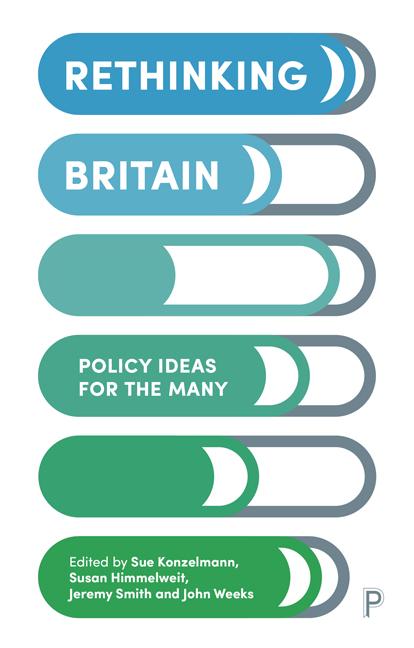Book contents
- Frontmatter
- Contents
- List of Tables and Figures
- The Contributors
- Foreword
- Introduction
- Interlude: ‘Mirror, Mirror, On the Wall – Who has the Highest Debt of All?’
- Part One Building a Full-Employment Economy: Introduction
- Part Two Public Investment – Prioritising Society Rather than Profit: Introduction
- Part Three Making Finance Work for Society: Introduction
- Part Four Genuine Social Security: Introduction
- Part Five How to provide for Social Needs: Introduction
- Conclusion
- Jargon Busters
- References and Further Reading
- Index
Conclusion
Published online by Cambridge University Press: 11 March 2021
- Frontmatter
- Contents
- List of Tables and Figures
- The Contributors
- Foreword
- Introduction
- Interlude: ‘Mirror, Mirror, On the Wall – Who has the Highest Debt of All?’
- Part One Building a Full-Employment Economy: Introduction
- Part Two Public Investment – Prioritising Society Rather than Profit: Introduction
- Part Three Making Finance Work for Society: Introduction
- Part Four Genuine Social Security: Introduction
- Part Five How to provide for Social Needs: Introduction
- Conclusion
- Jargon Busters
- References and Further Reading
- Index
Summary
We have sought to organise the policy proposals in this book under five broad themes that reflect principles of a future-focused social democracy. However, the ideas set out here come from almost 40 authors, and – despite their breadth and scope – neither pretend nor aim to form a comprehensive package of social and economic policy proposals.
Moreover, one of our editorial purposes for this book is to encourage and facilitate readers to dip in and out of the contributions, according to interest and opportunity. We have therefore not sought to set out a definitive set of ‘conclusions’ that would claim to draw together all the strands of policy to be found within the book's cover.
What unites all the contributions, however, is a spirit – a clear, strong sense that the hitherto dominant economic paradigm is not only shifting but also melting before our eyes, and that new policy solutions are urgently needed.
Since 1945, the UK and indeed all those countries comprising the ‘advanced economies’ have lived through two discrete politico-economic eras, each lasting some 30 years, and each giving rise to its specific suite of social and economic policies.
The first, which lasted (more or less) till the late 1970s, and whose end was symbolised by the British government going to the International Monetary Fund (IMF) for a ‘structural adjustment’ programme, we may call the era of managed capitalism, with a mixed economy and strong welfare state, and full employment as a key goal. Despite its hard ending, this era saw bigger increases in GDP per head and incomes, and lower inequality, than in any other.
The second, the ‘free market’ age, in which the state promoted and enforced liberalisation, privatisation and financial deregulation, held sway until the global financial crisis struck in 2008. The argument (often self-interested) that deregulated globalised finance, leading as it did to the build-up of unprecedented levels of private debt, was for the public benefit, imploded almost overnight amid its own contradictions, along with the economy itself.
- Type
- Chapter
- Information
- Rethinking BritainPolicy Ideas for the Many, pp. 221 - 226Publisher: Bristol University PressPrint publication year: 2019



